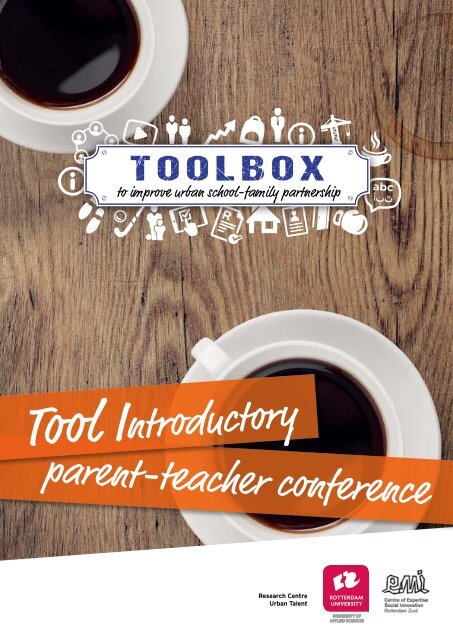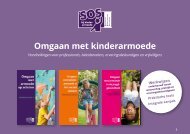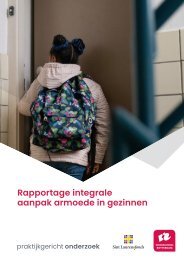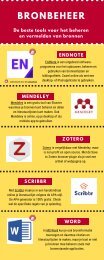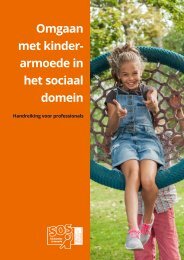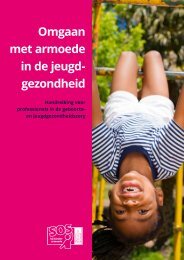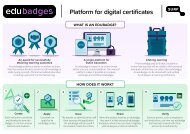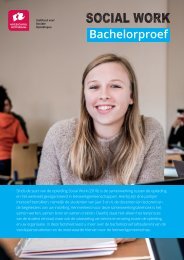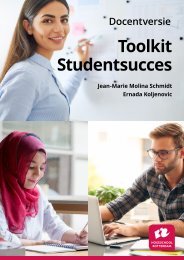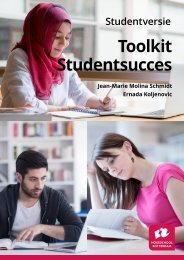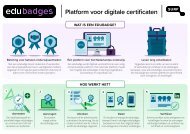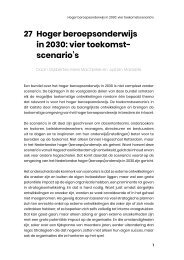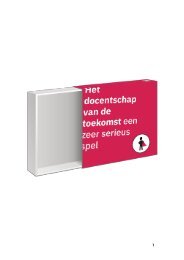Tool Introductory parent-teacher conference
You also want an ePaper? Increase the reach of your titles
YUMPU automatically turns print PDFs into web optimized ePapers that Google loves.
TOOLBOX<br />
to improve urban school-family partnership<br />
<strong>Tool</strong> <strong>Introductory</strong><br />
<strong>parent</strong>-<strong>teacher</strong> <strong>conference</strong><br />
Research Centre<br />
Urban Talent
<strong>Tool</strong><br />
What?<br />
<strong>Introductory</strong> <strong>parent</strong>-<strong>teacher</strong> <strong>conference</strong><br />
Arrange to meet the <strong>parent</strong>s (or other adult<br />
caregivers) of each pupil or student individually<br />
early in the school year. This will create the<br />
basis for a reciprocal relationship between<br />
<strong>teacher</strong> and <strong>parent</strong> in both primary and<br />
secondary education.<br />
Variation<br />
Home visit<br />
The introductory <strong>conference</strong> can also take place at the student’s home. The <strong>parent</strong>s may be more comfortable<br />
hosting the meeting and a home visit may increase positive attitudes towards school. These<br />
visits help <strong>teacher</strong>s demonstrate their interest in students’ families and allow them to form a better<br />
picture of the student’s background and environment. However, home visits are more time consuming.<br />
Not all <strong>teacher</strong>s feel at ease visiting <strong>parent</strong>s at their homes, and some <strong>parent</strong>s may feel threatened that<br />
<strong>teacher</strong>s want to meddle in the care and upbringing of their children.<br />
Language assistance<br />
The introductory <strong>conference</strong> can give <strong>teacher</strong>s insight in the support <strong>parent</strong>s can offer their child in<br />
their education, for example, in language development (lower grades in primary school). Observe<br />
<strong>parent</strong>-child interaction and ask <strong>parent</strong>s (respectfully) about their own education and school experiences.<br />
Discuss how you would like to cooperate with <strong>parent</strong>s on language (for example, in weekly walk-in<br />
activities in the classroom) and how you could support the <strong>parent</strong>s.<br />
Why?<br />
An introductory meeting allows <strong>teacher</strong>s and<br />
<strong>parent</strong>s to get to know each other so that they<br />
can guide and coach the pupil/student better.<br />
It also ensures that <strong>teacher</strong>s and <strong>parent</strong>s do<br />
not meet each other for the first time if<br />
problems occur.<br />
Go to<br />
www.rotterdamuas.com/<br />
toolbox<br />
<strong>Introductory</strong> <strong>conference</strong> after school activities<br />
This introductory <strong>conference</strong> is also important for staff in after school child care and after school activities,<br />
such as sports and cultural (music, dance) clubs. Focus on the interests and competencies of the child, not<br />
on deficiencies. Discuss mutual expectations (e.g. <strong>parent</strong>s attending sports matches or dance performances,<br />
and showing interest in these activities at home) and agree on how contact will be maintained.<br />
How?<br />
Discussion points<br />
Decide on the key discussion points with the<br />
teaching staff. These may differ depending on the<br />
student’s age. Ensure a balanced and focused conversation,<br />
and avoid making it feel like an interrogation.<br />
Discussion points may include:<br />
background and development of the pupil/<br />
student (at home, at school and outside school)<br />
expectations of <strong>parent</strong>s, <strong>teacher</strong> and student<br />
any topics proposed by <strong>parent</strong>s and pupils/<br />
students<br />
interests and talents of the student<br />
alignment of student guidance at home and at<br />
school<br />
agreement about communication between<br />
<strong>teacher</strong> and <strong>parent</strong>s (with both <strong>parent</strong>s in case<br />
of divorced <strong>parent</strong>s)<br />
the position and role of the student in this<br />
contact<br />
Manner of conversation<br />
The aim of the introductory meeting is to provide<br />
the basis for cooperation between <strong>teacher</strong> and<br />
<strong>parent</strong>. Therefore it is important that:<br />
the tone and message of the school is positive,<br />
so that <strong>parent</strong>s experience the meeting as<br />
getting to know the <strong>teacher</strong> and not as control by<br />
the <strong>teacher</strong><br />
<strong>parent</strong>s of all students are invited, also if everything<br />
seems to be going well with the student<br />
the student is present so that his or her<br />
perspective is heard<br />
there is an exchange of information and<br />
<strong>teacher</strong>, <strong>parent</strong> and student have an active role<br />
in the conversation<br />
Preparation<br />
decide on the discussion points and practise<br />
them in a roleplay<br />
invite <strong>parent</strong>s early in the school year and<br />
welcome them and their child warmly at school.<br />
Justification<br />
Mariëtte Lusse at Rotterdam University of Applied Science, the Netherlands has conducted extensive<br />
PhD research into the <strong>parent</strong>-<strong>teacher</strong> introductory <strong>conference</strong>. The introductory <strong>parent</strong>-<strong>teacher</strong> <strong>conference</strong><br />
was studied in five secondary schools (including schools for students with learning disabilities)<br />
in Rotterdam. 97% of the <strong>parent</strong>s attended these introductory <strong>conference</strong>s. These <strong>parent</strong>s were more<br />
satisfied about their relationship with the school, the information provided by the school, and felt more<br />
invited by their child to participate in their school life than <strong>parent</strong>s who attended a regular PTA meeting.<br />
The language version of the introductory <strong>conference</strong> was developed in ongoing PhD research on how to<br />
facilitate low-literate <strong>parent</strong>s in guiding their child in language development by Martine van der Pluijm,<br />
Rotterdam University of Applied Science, the Netherlands.<br />
Read more?<br />
Lusse, M. (2013). A Matter of Confidence. Design based research on the improvement of school<strong>parent</strong><br />
contact in urban pre-vocational education to prevent school drop-out Rotterdam: Hogeschool<br />
Rotterdam Uitgeverij.<br />
Several articles in English are being developed. There will be a notification in the toolbox<br />
(www.hr.nl/toolbox) when the articles are published.
Factors for success<br />
in well-organised <strong>parent</strong>-<strong>teacher</strong> introductory <strong>conference</strong>s are<br />
Make CONTACT between school and <strong>parent</strong>s<br />
1 √ ensure positive contact at an early stage<br />
2 √ gain insight into the child’s life at home, at school and outside school<br />
3 √<br />
meet the <strong>parent</strong>s (or other adult caregiver) of each child under your<br />
responsibility<br />
COOPERATE between school, <strong>parent</strong>s and students<br />
4 √ ensure the pupil/student is present and offer him/her a clear role<br />
5 √ maintain dialogue and exchange of information with <strong>parent</strong>s<br />
6 √<br />
focus on the <strong>parent</strong>s’ view of his or her child and on how the <strong>parent</strong>s<br />
can contribute to the development of the child<br />
7 √ focus on the positive (i.e. what the student likes and is good at)<br />
Support the student in his/her FUTURE CAREER PROSPECTS<br />
8 √ discuss hobbies, interests, talents of the pupil/student<br />
9 √ make agreements about how to maintain contact with the <strong>parent</strong>s<br />
10 √ discuss disappointments and redirect these to a new perspective<br />
contact<br />
future career prospects<br />
cooperate<br />
www.rotterdamuas.com/toolbox<br />
The toolbox to improve urban school-family partnership contains tested methods which are<br />
usable in practice. The toolbox was developed by the research group ‘Parents in Urban Context’ of<br />
the Rotterdam University of Applied Science, conducted by dr. Mariette Lusse (m.e.a.lusse@hr.nl).


